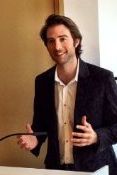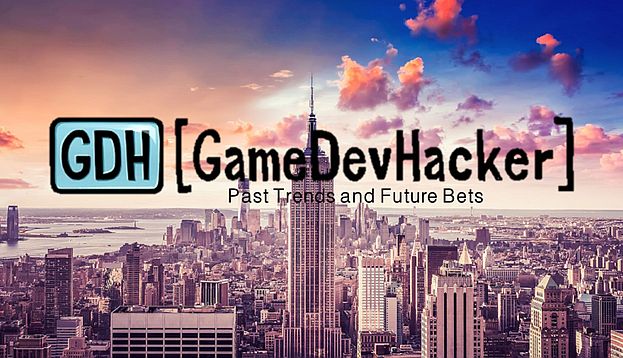The incredible rise of the indie game developers over the last decade has been a tremendous story, of how small teams or even individuals can craft a vision into a game that can be enjoyed by thousands or even millions. In many ways we’re truly in a golden age for indie game developers, but at the same time it’s also getting more and more difficult to make a living at developing games on your own or in a small team. That’s where events like GameDevHacker, being held on Jan. 28, 2015 in New York City, can help by providing a place to learn more about bringing games to market successfully.
As the conference web site notes: “Making games is hard! Gather with GameDevHackers all star lineup to hear, mingle, and discuss topics that drive serious growth. This is a no joke collection of topics that confront game developers and business people alike. See how the industry attacks some of the toughest challenges of the past, and the future bets they’ll be making.”
Eric Yohay, who’s organizing GameDevHacker, spoke with [a]listdaily recently about the one-day event and how to get the most out of it.
 Eric Yohay
Eric Yohay
How did GameDevHacker get started?
I used to run a company that’s now called Playcrafting. We were really good at teaching people how to make games, and how to pump them out. Consistently, what I saw was we’d have 50, 100 or 200 making games every month, new people who’d never made them before, and they’d all come back to me with the same question: “Eric, I spent all my time and energy making this games and that was what I had in my sights, but now that I’ve launched it I’m clueless. How do I make it a business, how do I get downloads, how do I attract partners What should I be doing now that I’ve made this game ”
So I spun this out separately, and the lens is how do you succeed in gaming and competing in today’s market. We’ve divided the conference into two different things: The past trends, and future bets. With past trends, what’s worked in the past — let’s talk actual hard numbers and data and discuss that. Then, tell us about future bets. Where are we going to spend our time, money, and energy moving forward.
Creating the audience is just as important as creating the product these days, isn’t it?
Exactly! I compare it to entrepreneurs who their whole game plan is to raise money, and that’s where all their time and energy is. They raise money, and then they’re clueless — they have no idea what to do after. You need to execute.
Are there certain key topics that are being addressed at the conference? What do you really hope attendees get some insight into and some help with at GameDevHacker?
The major goal is: How do you make money How do you succeed, how do you keep it moving Some core things we’re having that no one else has really done is we have Mikko Setala from Rovio coming in [executive vice president at Rovio], talking about Angry Birds from the start to where it is now. He’s talking about when you do have something take off, how to capitalize on it. Now they’re not even a gaming company, they’re more of a brand with stuffed animals and merchandise, and he’s talking about really outside-of-the-box things when you have momentum.
Another thing we’re really excited about is we have Brandon Quartararo from Digital Capital Advisors, he’s our keynote. We wanted someone to come in who wasn’t from the game space but knows a lot about it. He comes from the VC world, and he’s talking about the state of gaming: Who was the biggest M&A transactions, why are companies buying other companies, where are the exits. We really wanted to put a different perspective on this. We’re going to spend a whole day diving into details, but before we do that, let’s talk high level. Here’s how the space looks, here’s how it’s changed over time, here’s where we think it’s going.
Who should be attending GameDevHacker?
It’s the business person. In the indie world, it’s typically the engineer who is the business person, because they really understand and have a lot invested. The audience we cater to is the person who’s in charge of growing the company, whoever has a vested interest in making the company succeed. Engineers, if they’re also the business owners. It’s business development people if they’re looking to cut deals. CEOs and founders if they want to see what other CEOs are doing. It’s about really good content from the speakers, and really good people in the audience who can talk with other people.
We have two types of people, and we separate them by very strong lines. We have the indie developers, and they are coming because they want to hear what the large studios are doing. If you have unlimited time and energy and money, what are you doing Then we have the large companies coming in to see what you’re doing if you don’t have any resources and you’re real creative. We shwcase both and let them share, and create an environment where there’s very easy information flow.
For people who are attending, how can they get the most out of the event?
The first thing is have a game plan in want you want to learn from the show. ‘I just launched the game, and I want to grow to a million users.’ Everything you hear, put that lens on it so you know the right question to ask, you know how to frame everything, and you walk away with takeaways. Step #2, don’t be afraid to ask questions — and if you did step #1, it’s much easier. If you’re in a monetization panel, or you’re in a panel on how to get into emerging markets you can frame the question in a way that leads back to your goals and what your game plan and takeaway strategy is.
Finally, network. At the end of the day, everyone’s a real person. We’ll have speakers who will give precise answers in a public forum, but behind closed doors they may have other ideas. They may not want to share to a large audience, but one on one, I think they will. That’s why we have lunch as kind of an open forum, and coffee breaks, and at the end of the day it’s happy hour. At that point it’s a way to socialize and talk real with people who are in the same space.

